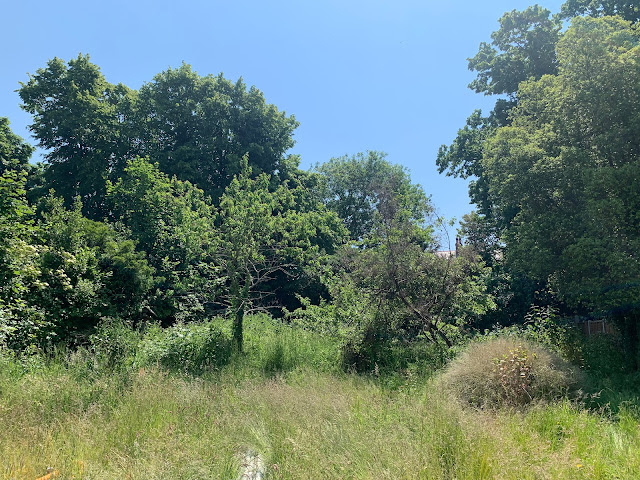The drama of the week was the goose egg incubator packed up on Tuesday so I had to ambulance them back down to the Little Oak base to put them in a temporary incubator while we changed the fan. I blew the fuse on the campervan trying to keep the incubator on so fingers crossed they survived the journey. We candeled them too and we've got 6 good ones, 3 questionable ones and 3 non-starters.
Cherry-bark Tortrix, Enarmonia formosana from my mum's garden
Japanese Medlar or Loquat- a few of these in the gardens we do but not that common
I spent far too much of my life this week dealing with these!
Good to see a bit more of this in people's front gardens
One of my favourite back garden environments in Wallington, an Old quarry has been incorporated into the extended back gardens of multiple houses creating this secret sunken gem. The area is about 5-6 acres made up from several tens of houses and gardens so a nice example of collective urban ecology. We do a lot of the gardens in here.
Urban rewilding- a few gardens, often owned by slum landlords, are abandoned/unmanaged, creating little ecological hotspots across South London. The link between poor management/corruption and urban rewilding is an unethical but handy one and no doubt there will be a constant supply of dicky old landlords in London to keep this trend up (good for nature not so good for the tenants who are probably too sick to get out in the garden anyway due to breathing in all the indoor mould). It's like a mini-example of the corruption across Eastern Europe and the developing world that stops funding or economic growth opportunities reaching landowners who would spend the money on intensively managing the land and killing all the wildlife. Gangsta Ecology is presumably more effective than the whole of the NGO sector if you think of the scale of Corruption and Inequality and the inverse link between natural and economic capital . Along the same lines of questionable ethics and ecological outcomes Pablo Escobar introduced Hippos into Columbia which have now naturalised (creating a novel ecosystem there although there are plans to remove them by purists) and it was the National Socialists of Germany that pioneered nature conservation in Europe, there's even a book on that called 'How Green were the Nazis' (HERE).
In a lot of places in the world there is an inverse relationship between Economic Wealth and Natural Wealth (The more Economic Capital the less Natural Capital although this is not true for places like Costa Rica and Bhutan) and part of the hard left agenda (like Low Carbon Birding) is an attempt to institutionalise poverty to reduce ecological footprints. The grey world of nature conservation is a funny old game, nature finds a way through all our subjective ethics, ideology and political posturing, it moves like a fluid in-between the cracks of all our dominance hierarchies not always reflecting the accompanying rhetoric e.g. is the nature conservation NGO model of giving social licence to the Corpocracy (like when Viridor were destroying Beddington but giving money to the RSPB and the Great Crane Project for ESG status) or how people like Chris Packham alienate and polarise farmers against nature conservation, is that more destructive to nature than for example corruption in Bulgaria stopping EU funding (Intensive agriculture subsidises) getting to it's intended target and being creamed off by dodgy politicians and organised crime? It's possible the corrupt politicians are doing more for nature than the NGOs and celebrity conservationists? Indeed the road to hell is paved with good intentions and in nature conservation maybe the road to paradise is sometimes paved by people going to hell? I would like to think that nature is always one step ahead of our questionable ethics.
A fairly typical enquiry- a Sycamore competing with a summer house and seating area dropping sap and tree litter so making the area un-usable. It's a neighbours tree and they don't want to fell it so the options here are to prune back the overhang or to keep the tree more balanced to reduce it substantially which has it's own trade off implications. Some trees respond to crown reduction better than others (Beech badly, Sycamore in the middle and Limes and Willows love it). The best option here would have been to put the summer house in the other back corner of the garden so like anything getting the planning and design of the garden right in the first place prevents these worst of both world situations.








No comments:
Post a Comment